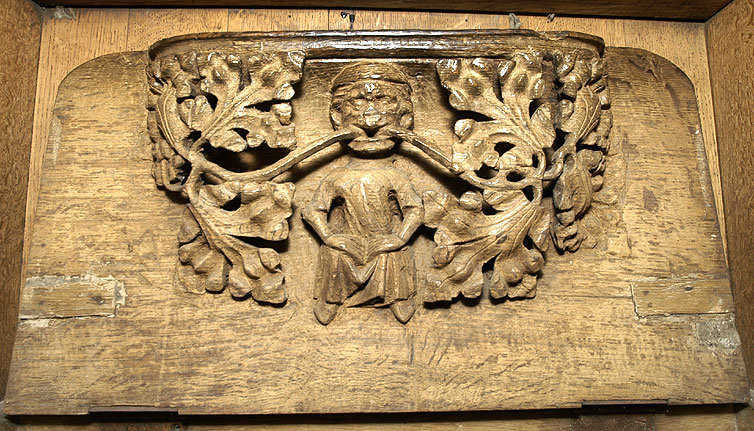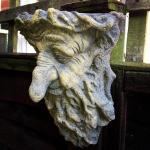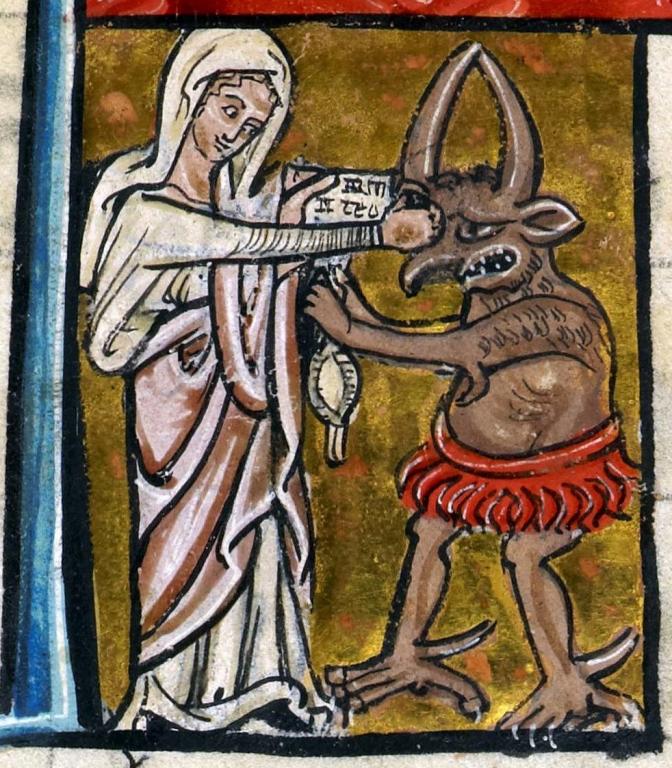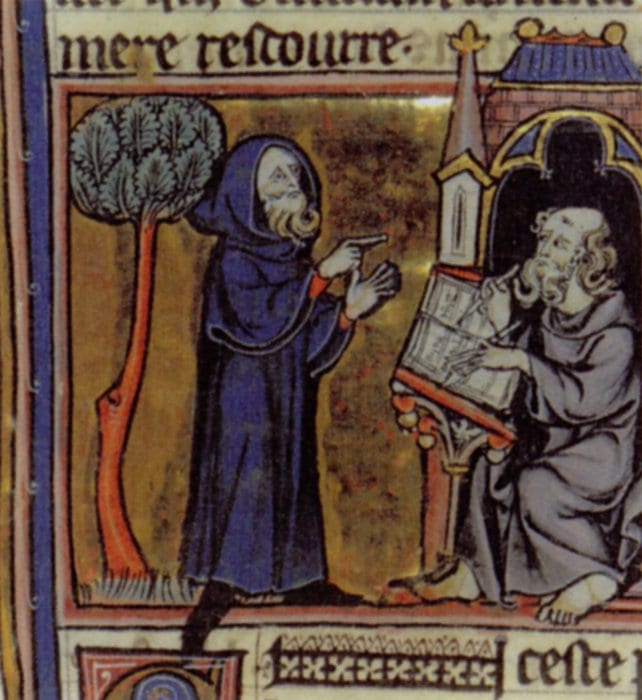
English: A photograph of a misericord in Southwell Minster, taken by myself in 2005.
Date 20 November 2006 (original upload date)
Source Transferred from en.wikipedia to Commons by Kurpfalzbilder.de using CommonsHelper.
Author MedievalRich at English Wikipedia
Ordinary Time
6 June 2018
The Edge of Elfland
Concord, New Hampshire
Dearest Readers,
As I continue to think about the green man this week, it dawned me that there is something unusual about his inclusion in churches: he is never green. The green men are always carved out of stone. This got me to thinking about Tolkien’s ents. Let me explain what I mean.
In The Two Towers as Treebeard, the ents, and Merry and Pippin begin their march to Isengard Merry asks a question which Treebeard seems to interpret as a question about the strength of the ents. Treebeard replies:
“‘Ho, hm, well, we could, you know! You do not know, perhaps, how strong we are. Maybe you have heard of Trolls? They are mighty strong. But Trolls are only counterfeits, made by the Enemy in the Great Darkness, in mockery of Ents, as Orcs were of Elves. We are stronger than Trols. We are made of bones of the earth. We can split stone like the roots of trees, far quicker, if our minds are roused. If we are not hewn down, or destroyed by fire or blast of sorcery, we could split Isengard into splinters and crack its walls into rubble'” (TT, Book 3 Chapter 4).
On first blush it seems that trolls are related to stone in some manner similar to how ents are related to trees. But, Treebeard does not know all. Tolkien himself reminds us of this in Letter 153, though he does ultimately decide that the stone-trolls at least likely are made counterfeits, quite possibly, though by no means certainly, stones that have become inhabited by maiar in a similar way to how balrogs are spirits of fire which have incarnated themselves. Either way, Treebeard’s ultimate point is how much stronger the trees are than stone, and not just stone but all minerals, including metals. This becomes particularly poignant if you know that Isengard comes from two Old English words which mean Iron enclosure. So Treebeard’s point is that the tree-men can tear asunder not only stone, but iron.
This, of course, brings me back to del Toro’s forest god whose roots can tear up New York city’s brick and iron buildings and whose blood can transform even metal cars into luscious grass and flowers. We do not see the ents with quite this life-giving ability, but the destructive force, and a destructive force that would prepare the land for more trees and others plants is evident. But of course, because they are in films and stories, these two green men, are primarily seen as destroyers, as reminders of the destructive power of nature. Yet if del Toro’s Princess Nuala is correct, they are givers of life as well. Where can we find this?
While there may be many places one of my favorites is Isaiah 55. Here, in the midst of a discussion about the place of the people of God in the grand scheme of things, in the midst of a discussion about their return to God, we read:
For as the rain and the snow come down from heaven,
and do not return there until they have watered the earth,
making it bring forth and sprout,
giving seed to the sower and bread to the eater,
so shall my word be that goes out from my mouth;
it shall not return to me empty,
but it shall accomplish that which I purpose,
and succeed in the thing for which I sent it.
For you shall go out in joy,
and be led back in peace;
the mountains and the hills before you
shall burst into song,
and all the trees of the field shall clap their hands.
Instead of the thorn shall come up the cypress;
instead of the brier shall come up the myrtle;
and it shall be to the Lord for a memorial,
for an everlasting sign that shall not be cut off (Is. 55.10-13).
When the Word returns (for so I interpret this passage) full then the mountains will sing and the trees will clap their hands. This is precisely why, unlike Sauron who may have made the stone-trolls in mockery of the ents, we are not making a mockery of nature when we place green men made of stone in our churches, for ultimately both belong to God, ultimately both will sing his praises.
Christian (most of the time) musician Sufjan Stevens has a song on his album Seven Swans entitle, “All the Trees of the Field Will Clap Their Hands.” The song has an almost melancholic feel too it as the repeating of the banjo keeps us in one place until finally more instruments are added to it. The singer is desiring to be part of what it is God is doing, part of the great dance, the great parade. In the second verse we hear:
And I heard from the trees a great parade
And I heard from the hills a band was made
And will I be invited to the sound?
And will I be a part of what you’ve made?
The singer wants to join in this song so fully that, in the final verse, he wants to abolish all of the things that keep him separated from God so he can join fully in the sound that creation sings to God.
So, when you see the green men in a church remember that this is not meant in mockery, but to give face to both the trees and the mountains who will clap their hands and burst into song.
Sincerely,
David











